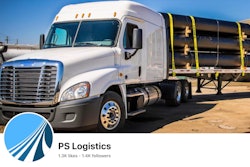What do professional truck drivers want? Recruiting ads lure drivers with promises of more money, benefits, home time, and sign-on bonuses. Is that what drivers really want? Research suggests they have something else in mind when they decide to stay or leave carriers.
Money is only part of the equation. Pay has increased significantly over the past year, but it seems to have made little headway for driver retention. Per-mile wages for drivers with just one year of experience increased a record 5.4% from Q1 of 2022 to Q1 of 2023, according to the National Transportation Institute. Yet driver turnover remained stagnant, ending last year at 89% for large truckload carriers and 73% for smaller carriers, per the American Trucking Association.
Fleets know they must offer competitive pay to attract drivers, but research consistently shows that one thing talks louder than money to keep them. Aretha Franklin spelled it out in her 1967 hit: “r-e-s-p-e-c-t.”
Randall-Reilly’s What Drivers Want survey in 2018 asked drivers if they would rather work for a fleet that paid less but made them feel respected. More than 70 percent of drivers said yes. This sentiment is consistent with 2022 survey results that show respect — or rather the lack thereof — is the underlying reason why drivers change jobs.
Motor carriers are showing drivers respect in numerous ways. Modern technology is making it easier than ever for fleets to prove to drivers that they are valued by saving them time, eliminating guesswork, improving communications, and helping them feel connected to a larger team - among other possibilities.
This article shares insights from Randall-Reilly’s 2022 What Drivers Want survey on driver attitudes and job behaviors. It also demonstrates how fleets can improve retention by showing drivers respect with custom apps that make work easier and more enjoyable, both inside and outside the cab.
Motivated by respect
Workers in any profession are unlikely to be totally satisfied with their income. Driver survey data shows that most have a sense of financial security. Completed in November 2022, the What Drivers Want survey found that 35% of company drivers earned between $75k and $100k, and 13% surpassed $100k.
Above-average pay in the driving profession might explain why truck drivers stay in the industry but change jobs frequently. Sixty-nine percent of survey respondents said they have been driving for more than 20 years. Money is not the only reason for choosing a driving career. Thirty-four percent of drivers said they got into trucking because they were drawn to the open road. Sadly, this perk is often buried by feelings of disrespect.
The survey asked drivers why they think fleets are having a hard time keeping drivers. Pay was the top reason (62%). A close second was “they don’t respect drivers and the job they do enough or treat them as part of the team” (60%).
When asked what they dislike most about their current job, drivers ranked government regulations (35%) on top followed by a lack of respect (20%). The main reason drivers would consider changing jobs is “because another fleet offered more money” (35%). The second reason (21%) was because another fleet “showed they appreciate the work I do and have a team atmosphere.”
Respect is part of a greater need by the trucking industry to make driving careers more attractive to younger workers. The Millennial generation and those who follow in their footsteps have all grown up using technology and expect the tools they use at work to mirror what they use in their personal lives.
Custom apps fit this bill. The technology also helps fleets show drivers respect by keeping them connected with tools and resources to be more productive, and safer, and to increase their skills to advance their careers.
Belonging to the team
Fleets can use integrated workflow and communication tools of custom apps to make work easier for drivers and make them feel like a member of the team, not a means to an end.
Prime Transportation, one of the nation’s largest fleets, chose to deploy a custom app that helps drivers complete most non-driving tasks, like communications and load documentation, faster by eliminating unnecessary steps and guesswork.
“Everything [drivers] need is in one place, and it feels seamless. Our drivers stay because they're happy,” said Brianne Madura, IT Manager of Prime Inc., which has a turnover rate far below the industry average for large carriers. Most of Prime’s drivers are independent and leased contractors and the custom app is used by 95%+ of them, even though it’s not required.
Among the many ways fleets use their custom apps to show drivers respect is by conducting surveys and collecting their feedback. Acting on the feedback quickly builds a culture of respect and trust. Prime Inc. regularly gathers driver feedback to add new app features.
Fleets that use custom apps to conduct surveys and gather feedback say it’s important to:
- Communicate the results to the drivers. Let them know how you plan to begin the improvement process, so they are aware of the change.
- Keep them updated regularly about the progress you are making on each of the improvement projects.
- Communicate to your current and prospective drivers that the changes you are making are in response to what drivers have told you. Be sure to share this news that they are being heard to maximize the impact.
Proactive communications
Many fleets use the communication tools of custom apps to stay ahead of potential driver frustrations. Fleets can use their apps to keep drivers connected with various departments such as operations, payroll, safety, and human resources to quickly get answers and information. As well, fleets can share company news and updates in various media formats to proactively engage drivers.
Keeping drivers informed lets them know they're respected and will improve job retention in the years ahead, according to a 2022 report from Conversion Interactive Agency and PDA. The report’s data shows that 54.9% of operations issues stemmed from a lack of communication. Over half of the drivers who reported this grievance cited “no response” or “slow response” from management as their biggest complaint.
Custom apps have many possibilities to help cultivate a driver-centric culture. Many of the features and tools that fleets use in apps show respect for drivers by saving valuable time during the workday so they can focus on what they do best to maximize earnings and return safely.











